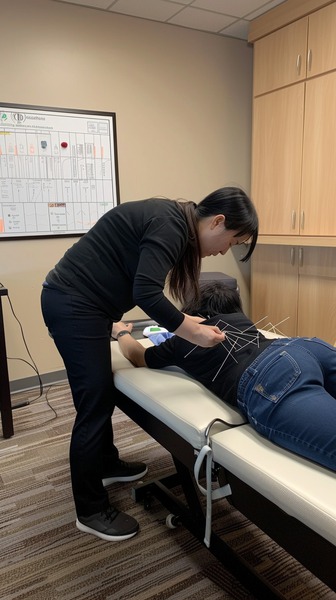
How Do You Maintain Professional Growth in the Field of Acupuncture?
Maintaining professional growth in acupuncture requires a continuous commitment to learning and self-improvement. Acupuncturists must stay abreast of the latest techniques, research, and holistic health trends to provide effective and up-to-date treatments. By participating in ongoing education, attending seminars, and joining professional organizations, practitioners can enhance their skills and knowledge, benefiting their patients and advancing their careers within this dynamic and evolving field. Here are some key strategies to ensure continuous development in this field:
1. Pursue Continuing Education
Continuing education is essential for staying updated with the latest developments in acupuncture and Traditional Chinese Medicine (TCM). Many professional organizations and institutions offer a variety of courses, seminars, and workshops that provide new insights and advanced techniques. These educational opportunities, particularly those focused on acupuncture education in Canada, help practitioners expand their knowledge base, learn about emerging research, and integrate new methods into their practice.
2. Obtain Advanced Certifications
Advanced certifications demonstrate a higher level of expertise and commitment to the field. Acupuncturists can pursue specialized certifications in pain management, fertility, sports acupuncture, or oncology. These certifications often require additional training and exams, ensuring practitioners have the necessary skills and knowledge to provide specialized care. Obtaining advanced certifications enhances a practitioner’s qualifications and opens up new career advancement and specialization opportunities.
3. Attend Conferences and Workshops
Attending conferences and workshops is a valuable way to learn from leaders in the field, discover new research, and network with peers. These events provide a platform for acupuncturists to stay informed about the latest trends, share experiences, and gain inspiration from others. Workshops often offer hands-on training and practical demonstrations, allowing practitioners to refine their techniques and gain confidence in applying new methods. Similarly, those involved in holistic nutritionist training can benefit significantly from these educational opportunities, as they provide essential knowledge and practical skills needed to excel in their practice.
4. Join Professional Organizations
Membership in professional organizations such as the National Certification Commission for Acupuncture and Oriental Medicine (NCCAOM) or the American Society of Acupuncturists (ASA) provides access to a wealth of resources, networking opportunities, and professional support. These organizations offer members access to exclusive educational content, industry news, and advocacy efforts that help shape the profession’s future. Being part of a professional organization also enhances credibility and demonstrates a commitment to high standards of practice.
5. Engage in Peer Collaboration
Collaborating with other acupuncturists and healthcare professionals can significantly enhance knowledge and skills. Peer review groups, study groups, and professional networks provide opportunities for constructive feedback, shared learning, and mutual support. Engaging with peers helps practitioners stay motivated, exchange ideas, and address common challenges. Regular interaction with colleagues fosters community and encourages continuous professional development.
6. Conduct and Publish Research
Engaging in research and publishing findings in professional journals contributes to the body of knowledge in the field and establishes the acupuncturist as a thought leader. Research activities foster critical thinking, analytical skills, and evidence-based practice. Acupuncturists who conduct research can explore new areas of inquiry, validate traditional practices, and contribute to the scientific understanding of acupuncture and TCM. Publishing research also enhances the practitioner’s reputation and visibility within the professional community.
7. Seek Mentorship and Supervision
Finding a mentor with extensive experience in acupuncture can provide invaluable guidance, support, and insights. Mentorship helps newer practitioners navigate the complexities of the field, develop professional skills, and build confidence. Supervision sessions allow reflection on practice, identifying areas for improvement, and developing effective strategies to address challenges. A mentor can offer personalized advice, share experiences, and help mentees set and achieve professional goals. Click here for more info on how mentorship can transform your acupuncture practice.
8. Develop Business Skills
Acupuncturists running their practice must develop business acumen, including marketing, financial management, and patient relationship skills. Workshops and courses in business management can be highly beneficial, providing the tools and knowledge needed to run a successful practice. Practical business skills help practitioners attract and retain patients, manage their practice efficiently, and ensure financial sustainability. Understanding marketing strategies, financial planning, and patient communication are critical to a thriving acupuncture practice.
9. Stay Informed About Regulations
Acupuncturists must keep abreast of changes in regulations and standards within their state or country. Understanding and adhering to these regulations ensures compliance and maintains professional credibility. Staying informed about regulatory changes helps practitioners avoid legal issues, uphold ethical standards, and provide safe and effective care. Professional organizations often provide updates on regulatory changes, making it easier for members to stay informed and compliant.
10. Practice Self-Care and Mindfulness
Maintaining personal well-being is essential for professional growth. Practicing self-care, mindfulness, and stress management techniques ensures acupuncturists can provide their patients with the best care and avoid burnout. Self-care practices such as regular exercise, healthy eating, and adequate rest support physical and mental health. Mindfulness and stress management techniques help practitioners maintain focus, resilience, and a positive outlook. By prioritizing self-care, acupuncturists can sustain their energy, enthusiasm, and effectiveness in their practice.
Wrapping Up
Professional growth in acupuncture requires a multifaceted approach involving continuous education, advanced certifications, active participation in the professional community, and personal well-being. By embracing these strategies, acupuncturists can enhance their skills, stay updated with the latest advancements, and provide their patients the highest quality of care. Continuous professional development benefits individual practitioners and advances the field of acupuncture, ensuring that patients receive the best possible care.
